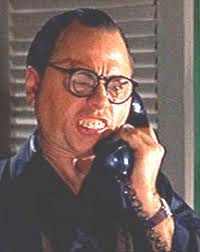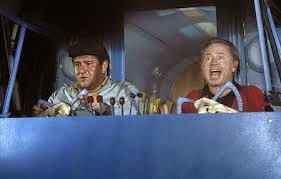My mother asked me why I never posted about the loss of Shirley Temple. I had my reasons: I wasn’t familiar enough with her work, she appeared to have lived a healthy, happy life. AKA: No Drama! Temple seemed to resist the scars and damage that comes with childhood movie stardom. But Mickey Rooney was different: He never stopped being a movie star. Although Rooney’s career peaked before World War II, Mickey permeated throughout the cinematic landscape for his entire life; even making a lovely cameo in 2011’s The Muppets during “Life’s A Happy Song”. For many children, he was just a regular old man — others were shocked to learn he was still alive! But for those who recognized him, Rooney was a legend.
I’ll always remember Mickey best from my first exposure to him in 1939’s The Adventures of Huckleberry Finn. It was my introduction to Mark Twain’s work and black-and-white cinema. I just adored it. In retrospect, Rooney was an odd choice to play the mischievous Southern boy. But I bought it. Rooney was natural; exuding a genuine friendship between him and his former slave, Jim. It was also the film that exposed me to the evils of slavery and racism.
Ironically, Rooney would age from leading man to character actor and stir controversy in 1961’s Breakfast at Tiffany’s for portraying Holly Golightly’s cantankerous Asia neighbor, Mr. Yunioshi. It is an unfortunate and insulting portrayal of Asia-Americans — a stirring revelation to the racism that carried from World War II and beyond.
However, I prefer to think of Rooney as someone who grew from the awe-shucks boyish persona that thrived in the Andy Hardy era and transformed into a tender, loving fatherly figure such as his Oscar-nominated turn in 1979’s The Black Stallion. Rooney was able to convey a sweet, nurturing tenancy in just about every film that demanded it. But he was always versatile. He could hold his own against comedy legends in 1963’s It’s a Mad, Mad, Mad, Mad World. One of the film’s best moments are between him and Buddy Hackett as they desperately attempt to control an airplane when their pilot becomes inebriated.
However, I believe the loss of Rooney marks an additional layer of sadness that goes beyond the loss of a fine actor and movie star. It echoes sounds of a final curtain call to a fantastic era, where greats like Cagney, Davis, Mitchum, Stewart, Crawford, Garbo, Cagney, and Wayne who have all left behind nothing but their memories preserved in celluloid. Rooney, who was one of the Golden Era’s youngest stars (along with Judy Garland and Temple). Now that’s he departed, I’m left to wonder if there’s anyone left to connect us with an important era in film lore. I believe Olivia de Havilland is one of the few to remain with us. But Rooney registered as someone who existed in the public conscious throughout the entirety of the sound era — and is gone.
Rooney’s work was eclectic and unmatched in longevity. He also showed me the beauties of black-and-white in more ways than one and I’ll forever be grateful. Oh, and he got to imbue one last hurrah to yours truly: He got to sing with the Muppets. That’s one hell of a career — and a life!




You actually do listen to me when I talk!! I loved them both!!